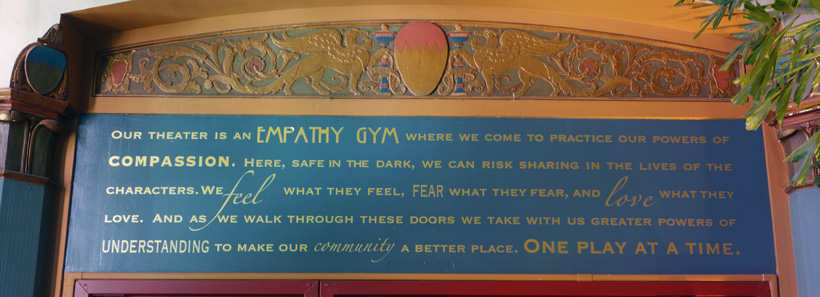
Most of you have heard me talk about the Empathy Gym – how San Francisco Playhouse has built a safe space where our community can practice its powers of compassion and empathy. But why do we need such a space? What makes empathy difficult to practice?
Is empathy something that comes naturally? Or do we learn it? Infants appear to have no sense of empathy: “I need to eat!” “My tummy hurts? “ “I’m cold” “I need to be held.” And teenagers, suffering an explosion of hormones and staggering growth, are another group not naturally known for empathetic prowess.
It seems empathy is something we develop as we mature. As adults, there are the sociopaths who cannot feel for others at all. On the opposite pole are the Olympic athletes of empathy: the Ghandis, the Martin Luther Kings, the Nelson Mandelas who put their lives on the line for others. The rest of us struggle along in the vast region in between, wishing we were more compassionate, but often unable to hold onto an empathetic point of view
What makes it so difficult? For me, the biggest roadblock is what I call “anti-empathy”, or Antipathy; the practice of dehumanizing people so we can hate them. We all do this. The Germans did it to the Jews, white Americans did and do it to African Americans and Native Americans. Blue states do it to red. And vice versa. For decades, American television has helped us objectify Russians, and now our popular media do it to Muslims.
This impulse is genetic. And it makes sense. Soldiers preparing for war cannot survive if they empathize with the enemy. Hence, they come up with objectifying terms: “krauts,” “gooks,” etc. Antipathy is a part of our hard-wiring that in primitive times was necessary for survival, and yet in today’s increasingly polarized world we need to outgrow it to survive.
 San Francisco Playhouse offers an antidote to antipathy. We don’t take sides. We encourage our audience to identify with every character, even the ones with malevolent impulses. For example, in DOGFIGHT, our upcoming Fall show, we will spend time with a group of Marine recruits, still wet behind the ears, about to be shipped off to Vietnam, who have been programmed to kill. They have been dehumanized so they can dehumanize the enemy. The sordid game they play to win a prize by dating the most unattractive girl is a post-boot camp extension class in the art of antipathy. Deplorable. But when one of them unwittingly stumbles into the Empathy Gym, we watch as his armor is systematically chiseled away by a young woman in a prom dress.
San Francisco Playhouse offers an antidote to antipathy. We don’t take sides. We encourage our audience to identify with every character, even the ones with malevolent impulses. For example, in DOGFIGHT, our upcoming Fall show, we will spend time with a group of Marine recruits, still wet behind the ears, about to be shipped off to Vietnam, who have been programmed to kill. They have been dehumanized so they can dehumanize the enemy. The sordid game they play to win a prize by dating the most unattractive girl is a post-boot camp extension class in the art of antipathy. Deplorable. But when one of them unwittingly stumbles into the Empathy Gym, we watch as his armor is systematically chiseled away by a young woman in a prom dress.
Antipathy is addictive. It gets our blood going. Makes us feel alive. It sells movie tickets. Its fun, especially when it’s make-believe. But when we are frightened by how easily hatred boils up in our throats, when we desperately need to undo the power of antipathy by feeling with others, we come to the theatre for the antidote.
Please write me back to let me know what you think about empathy and antipathy and the theatre.
All the best,

Bill




I have developed a workout that uses movement and performance to teach self empathy and thus secondary empathy outside oneself. I focus on core training and have infused mediation energy work, sensual movement, laban, viewpoints, Alexander and private movement exercises.
I think it is very much needed for the youth of today as they are faced with sorts of regular anxiety